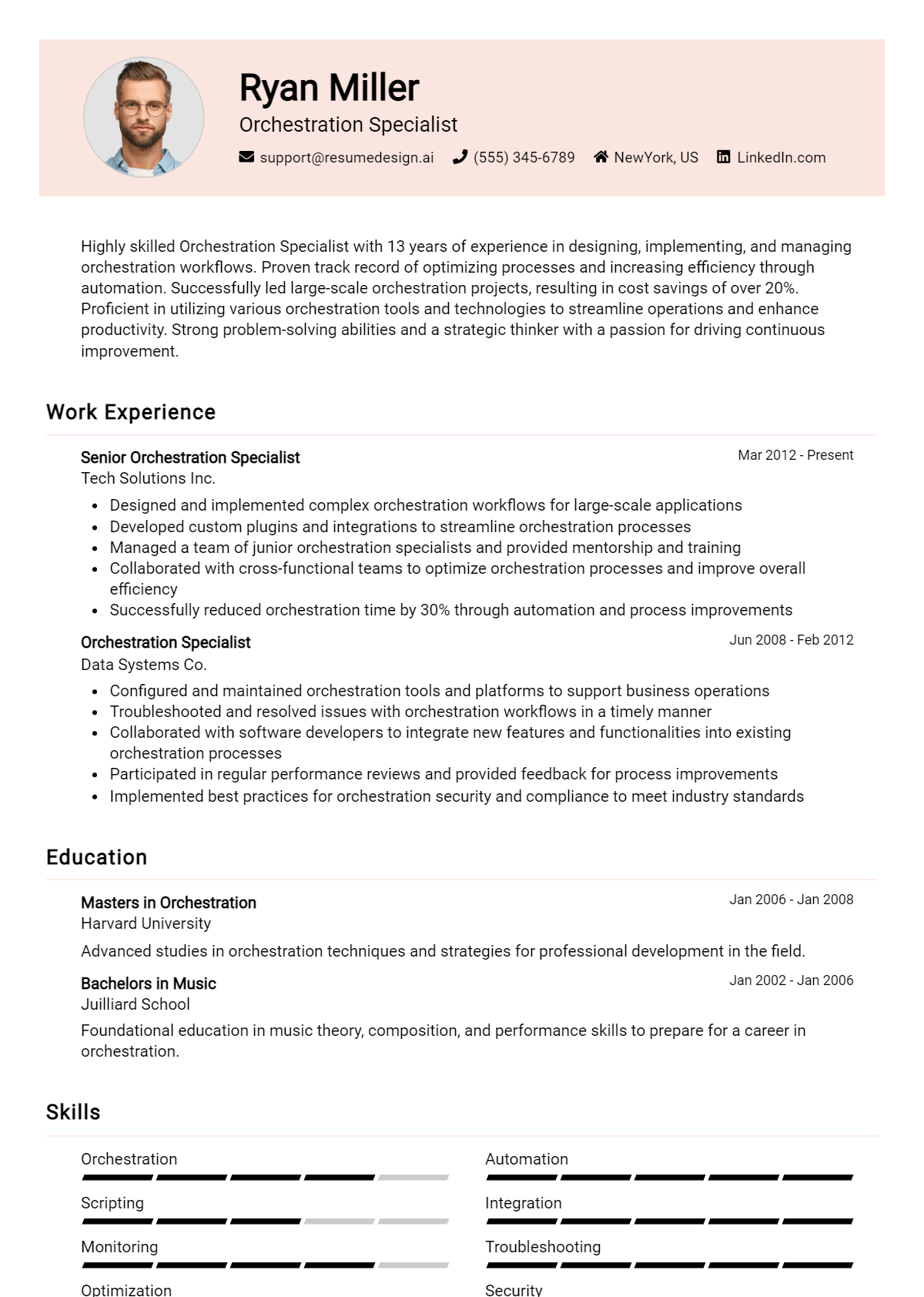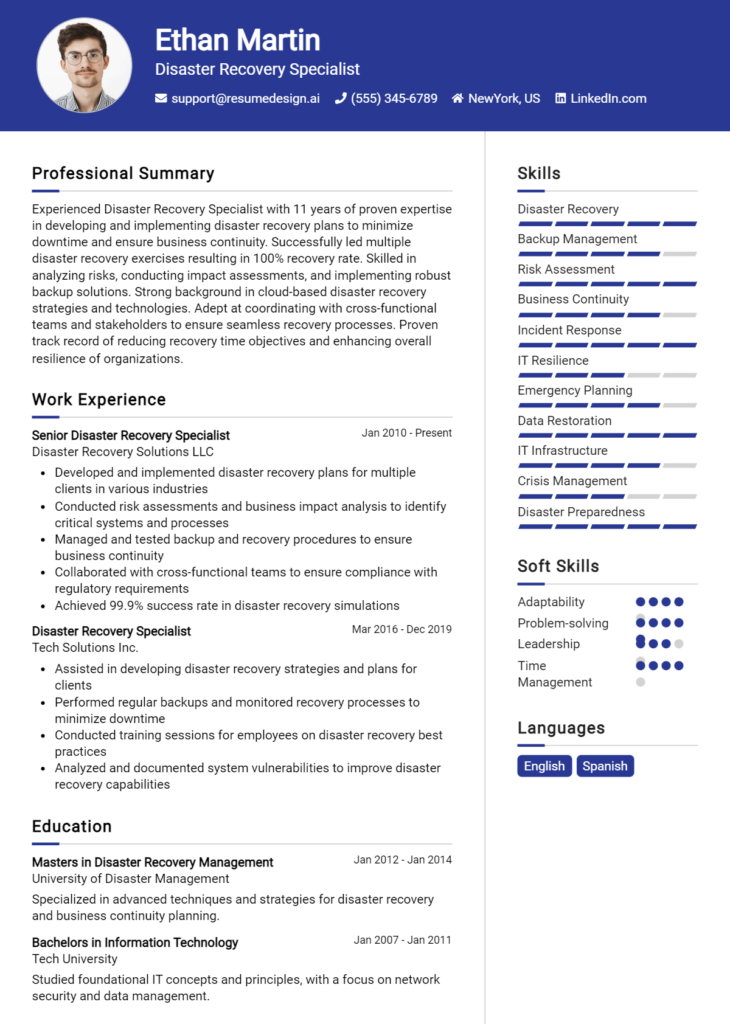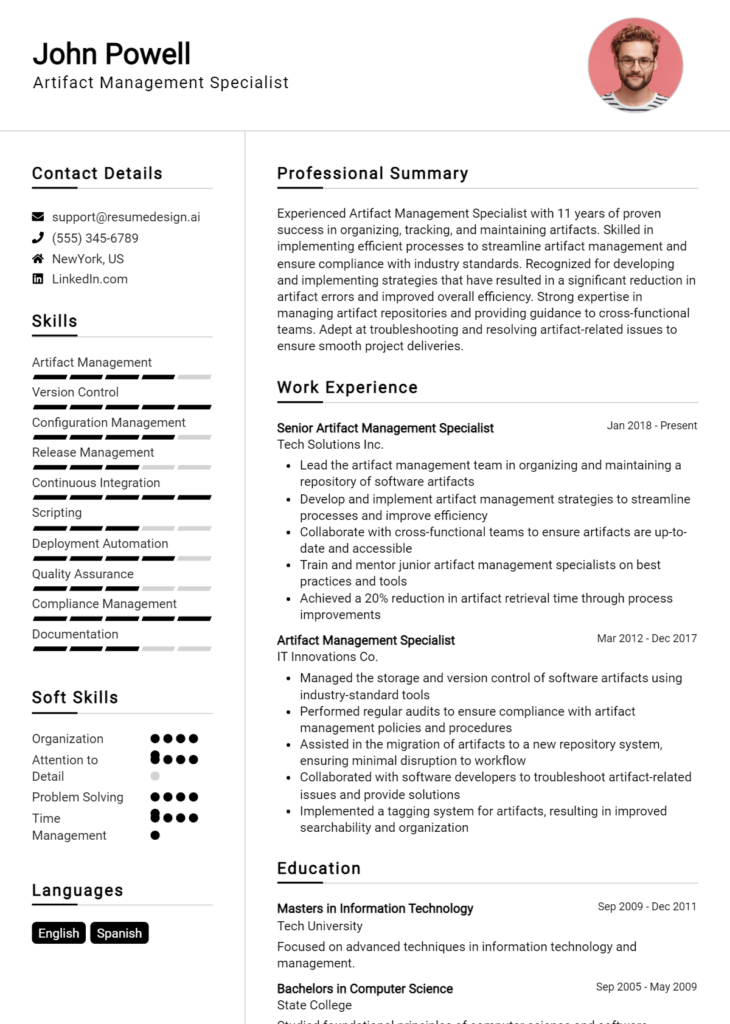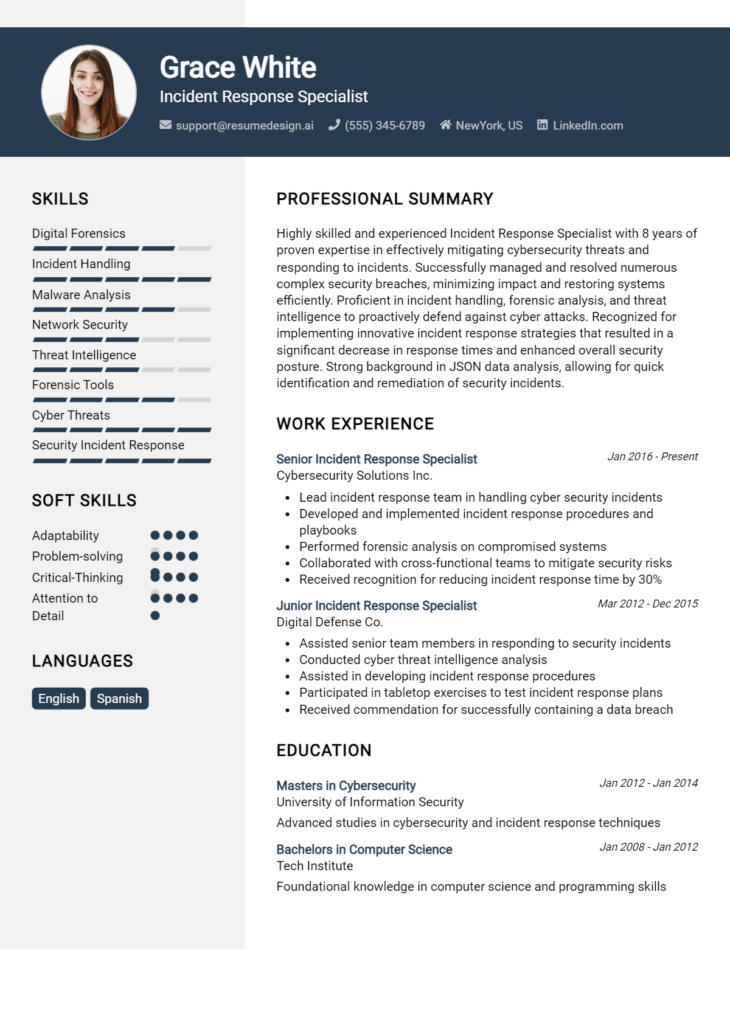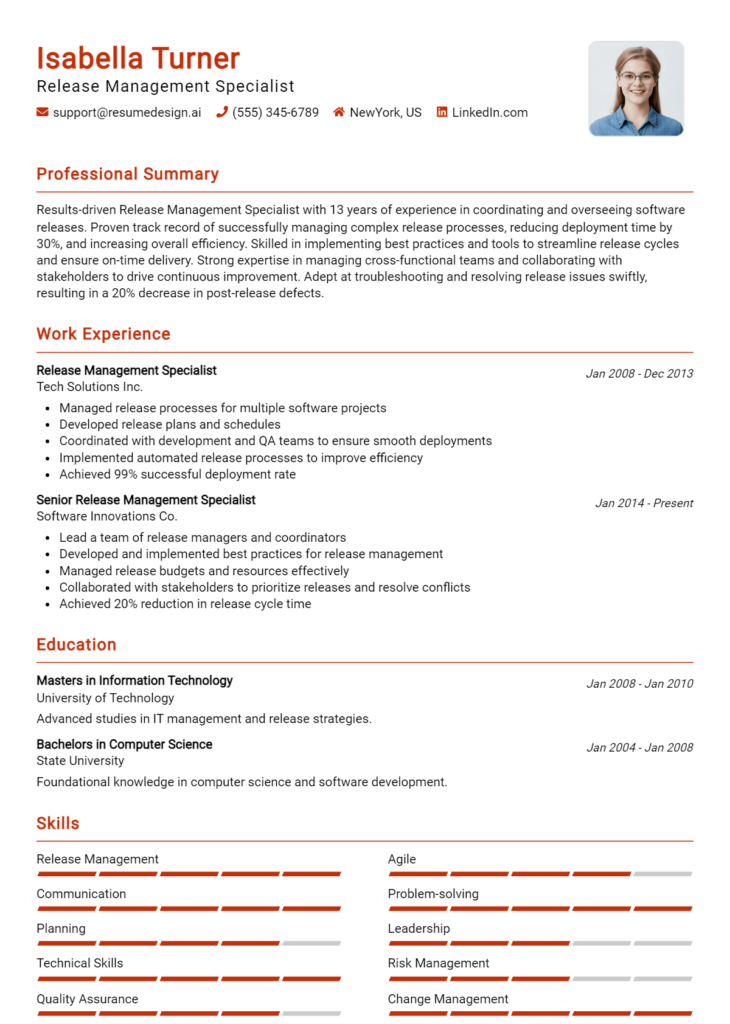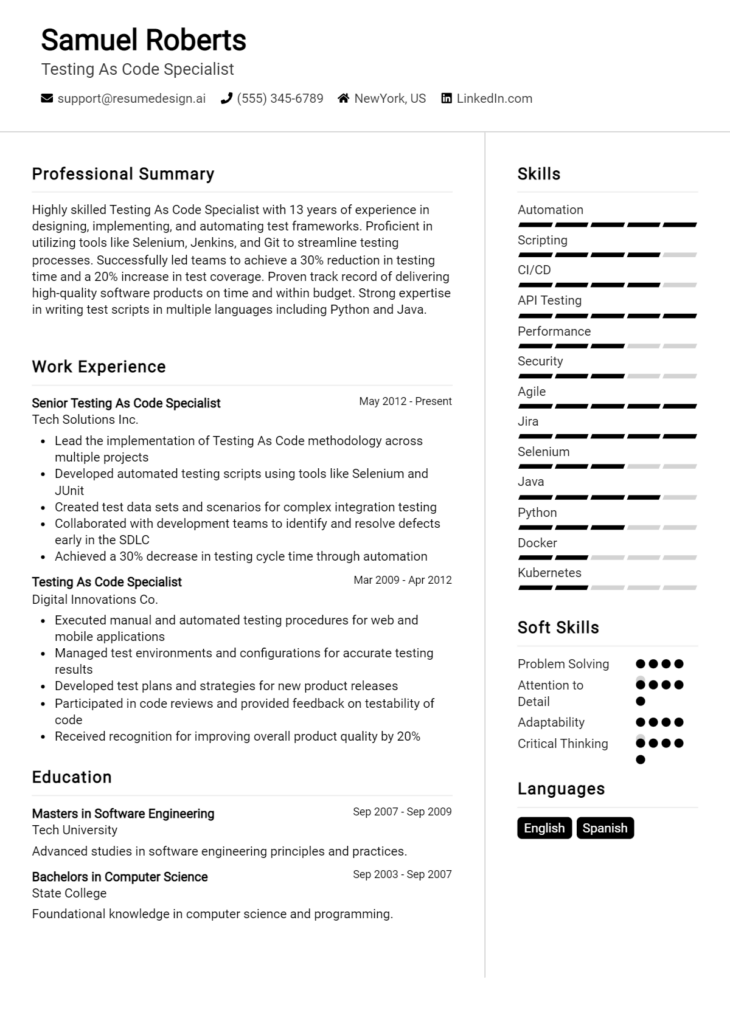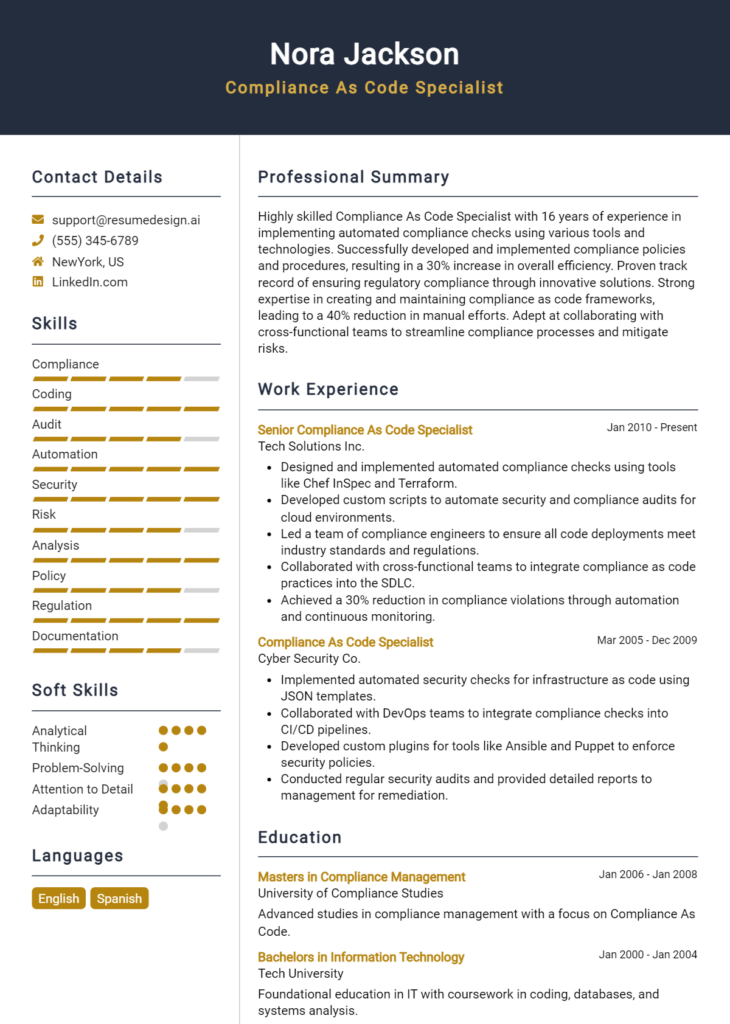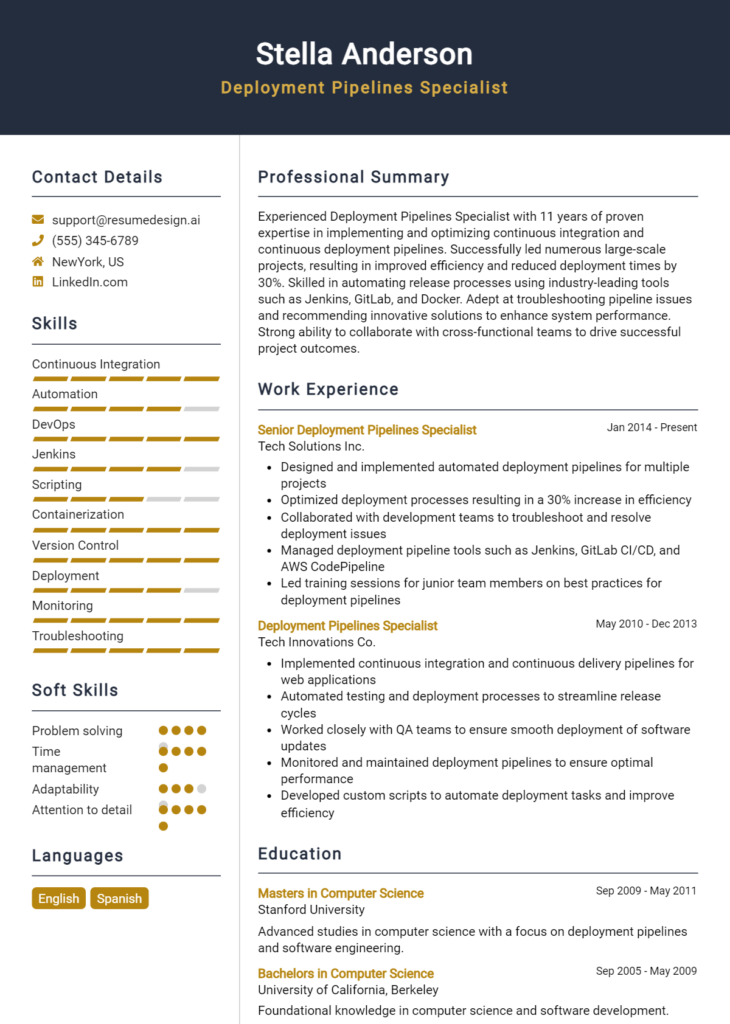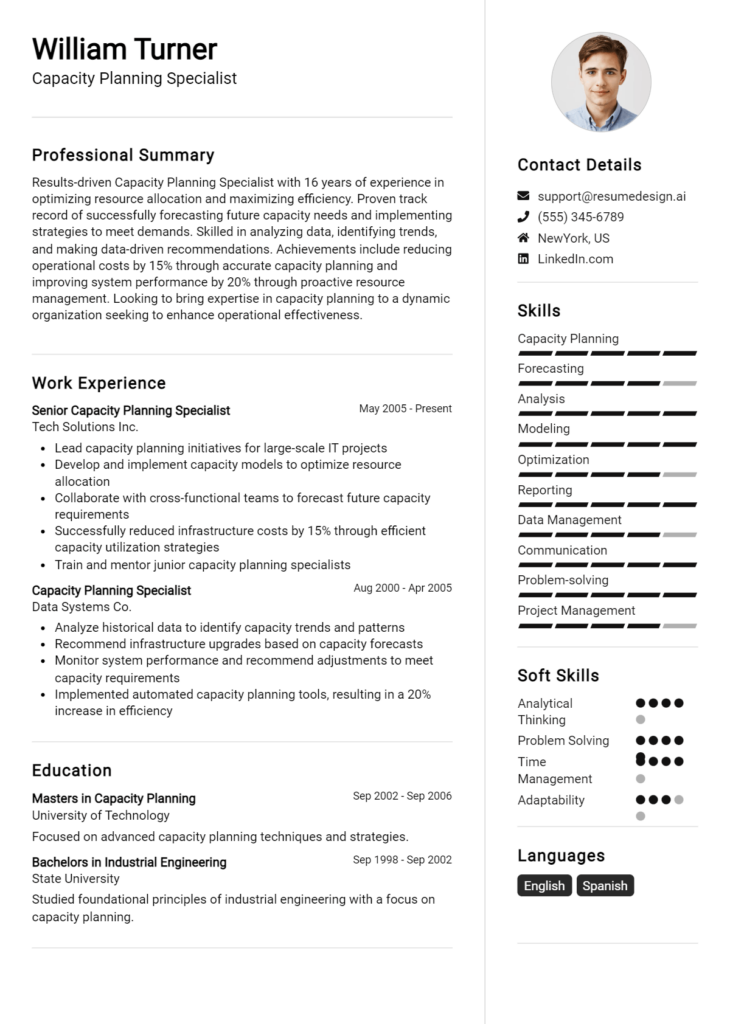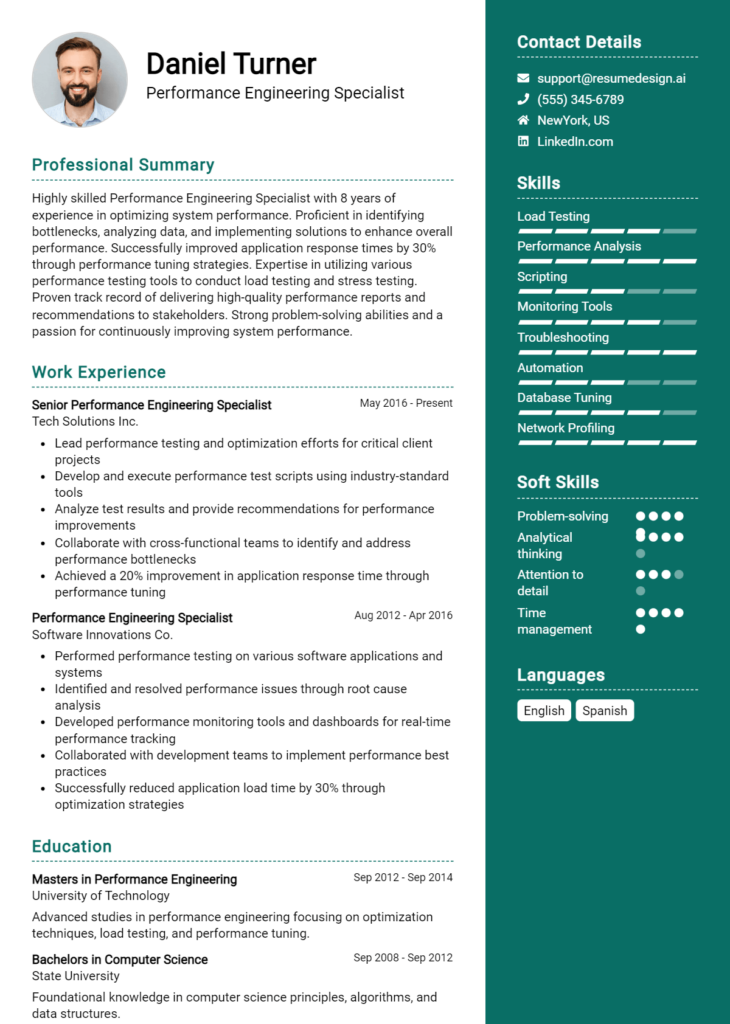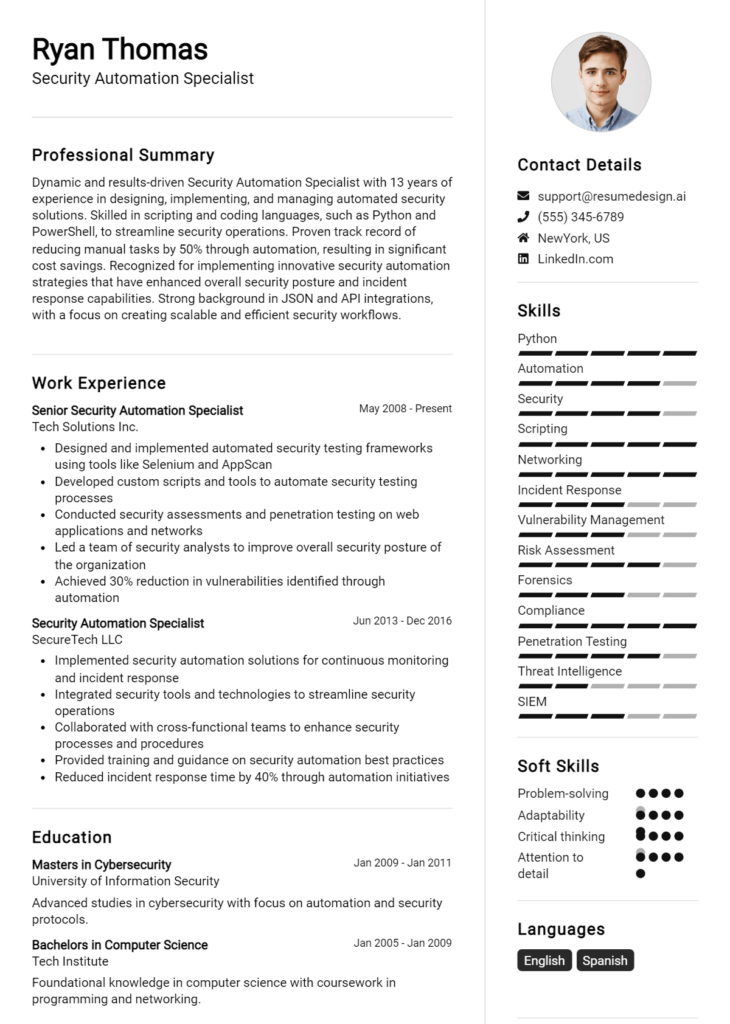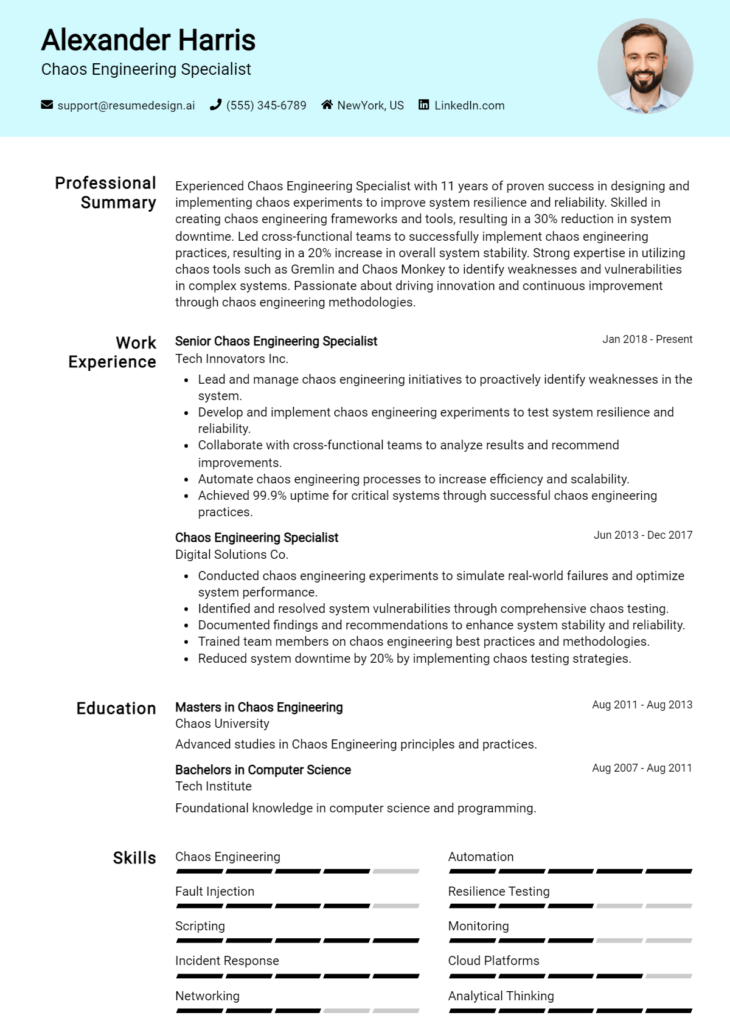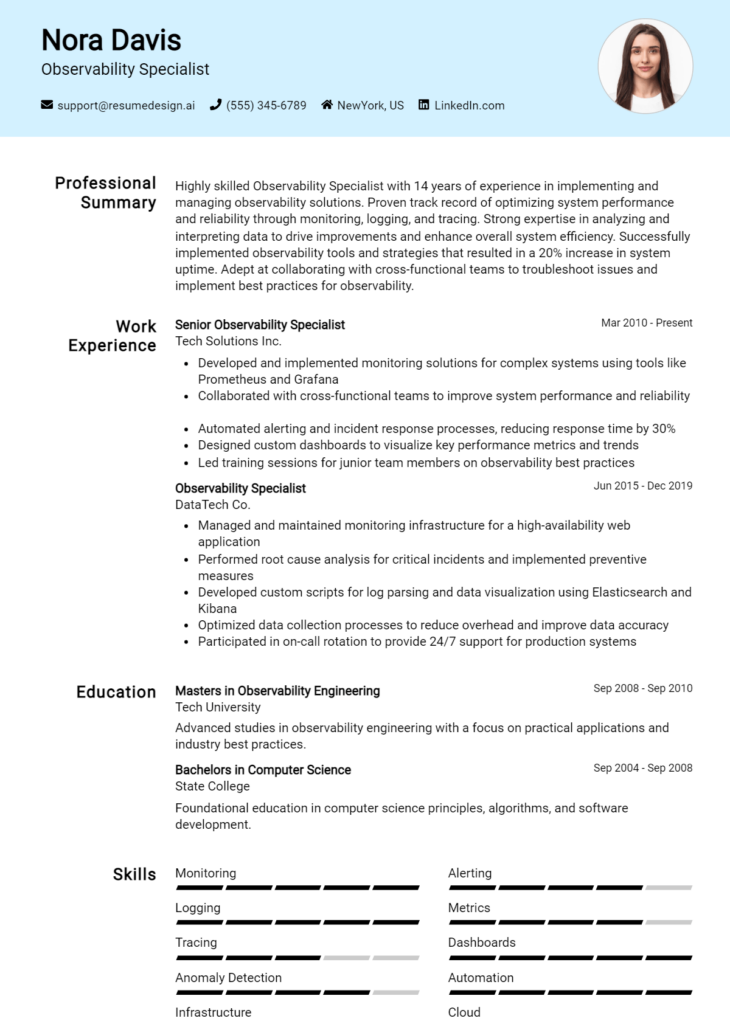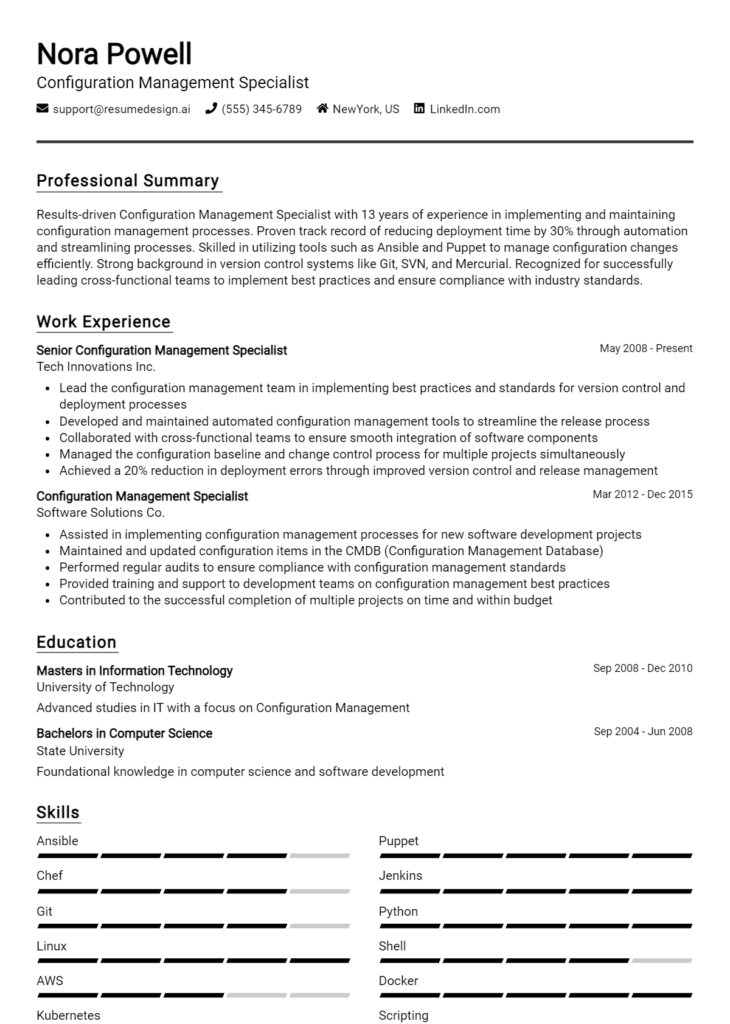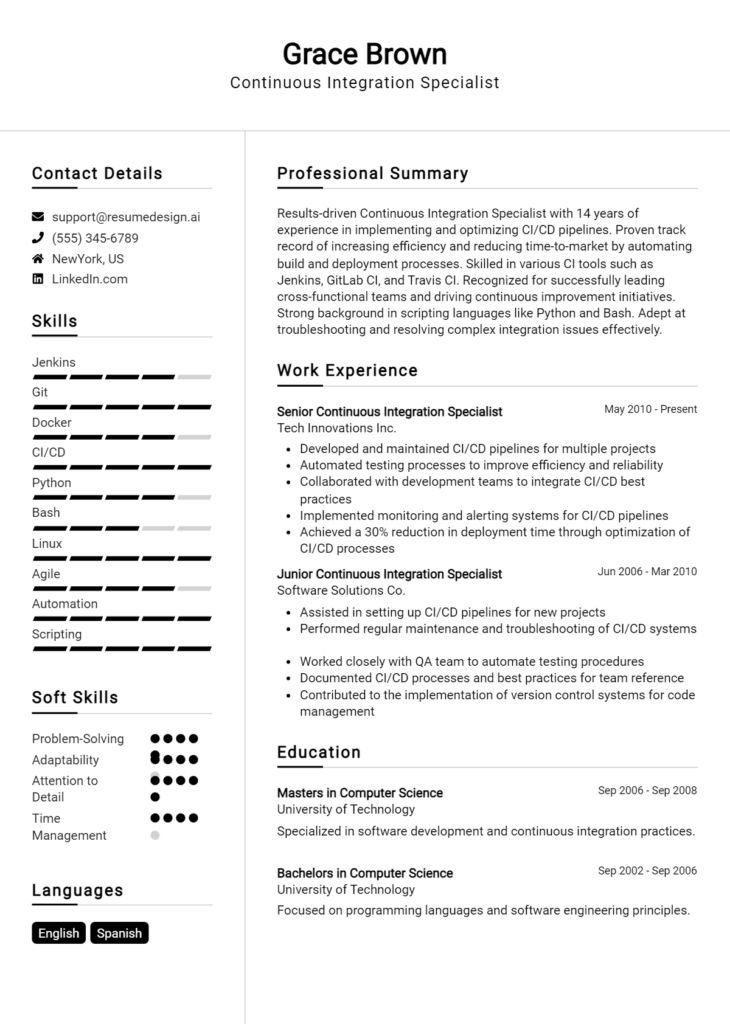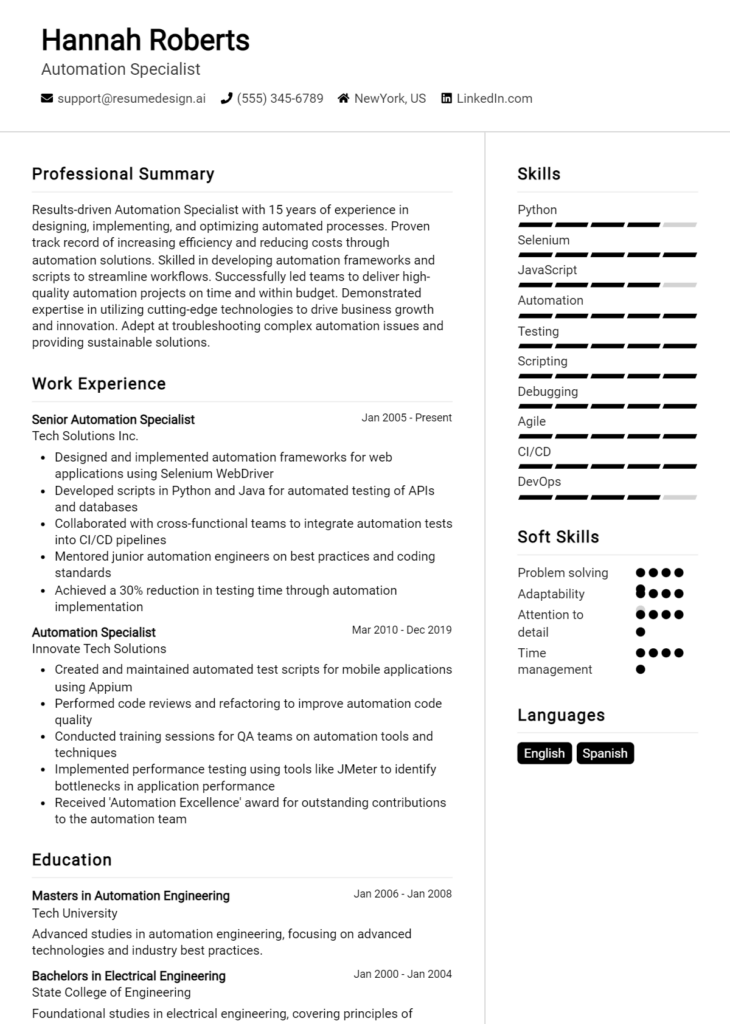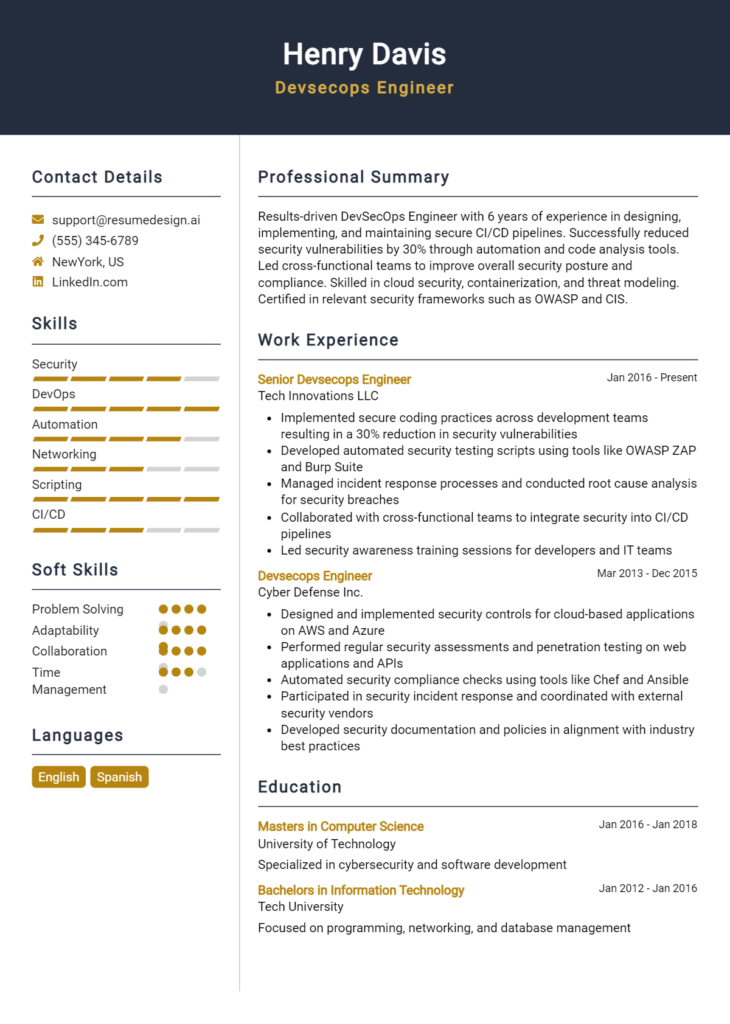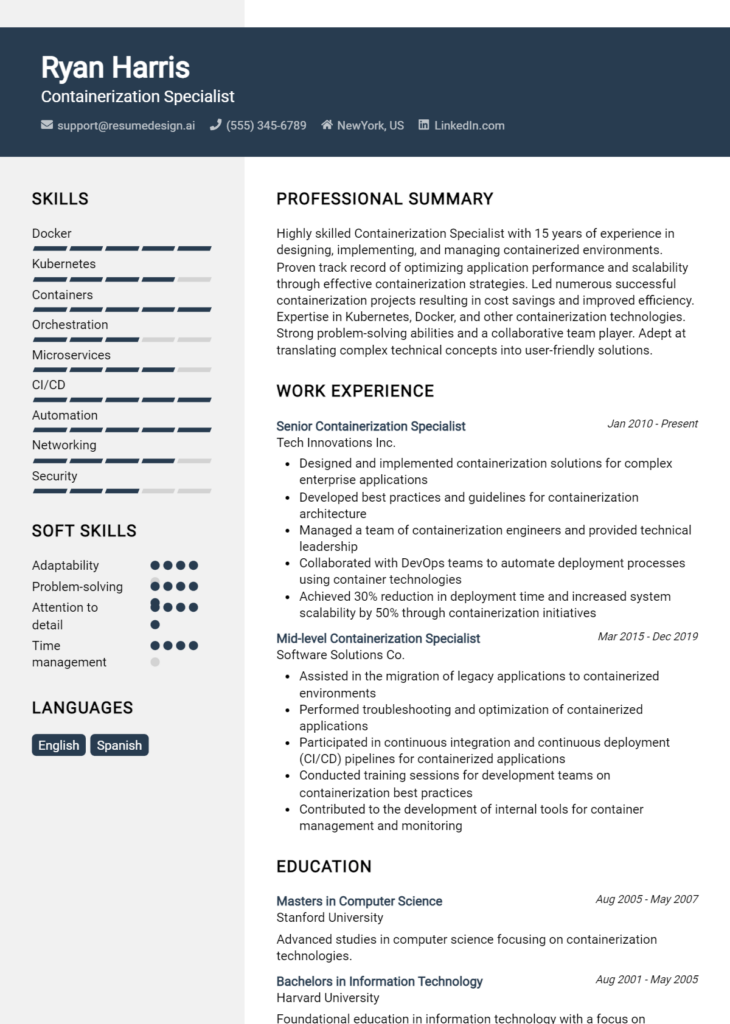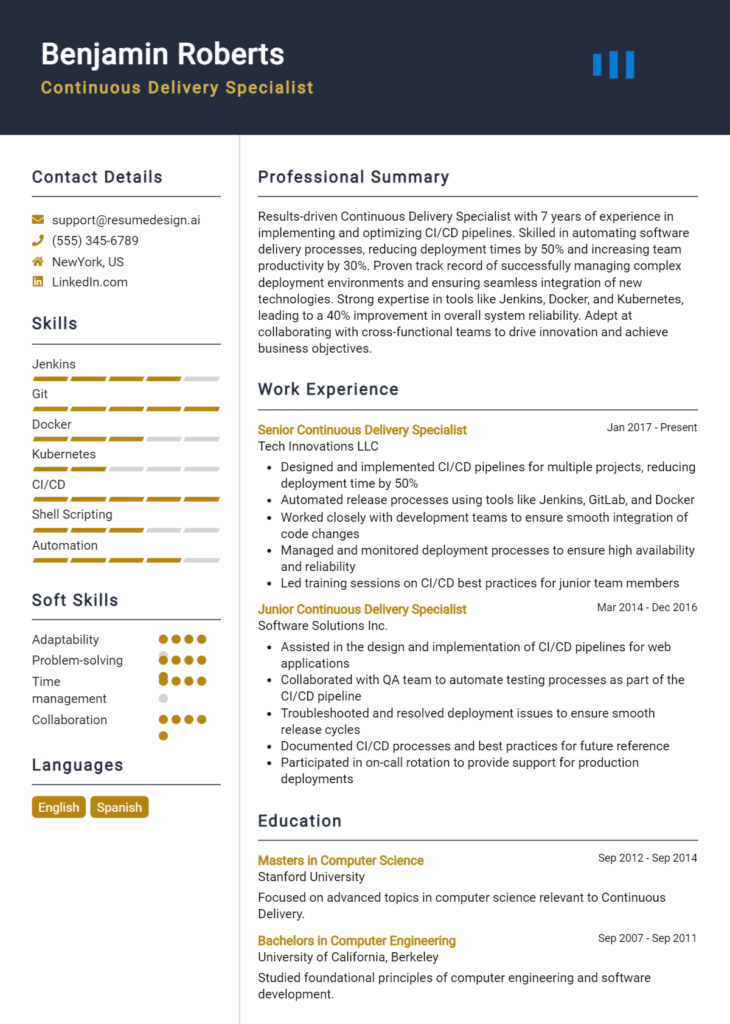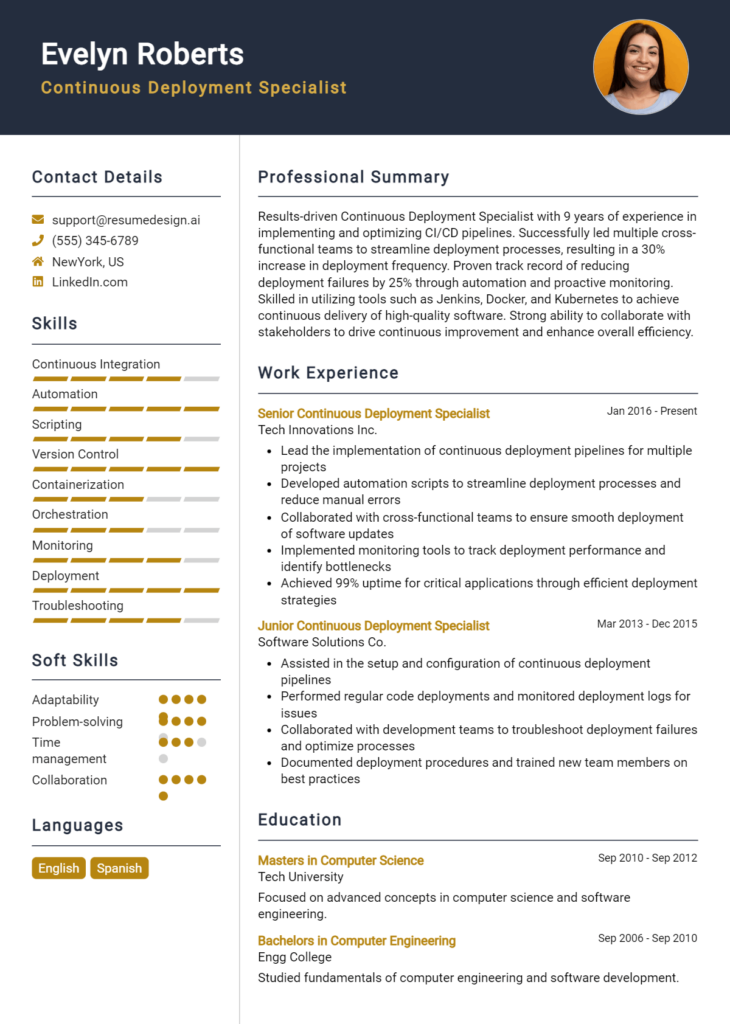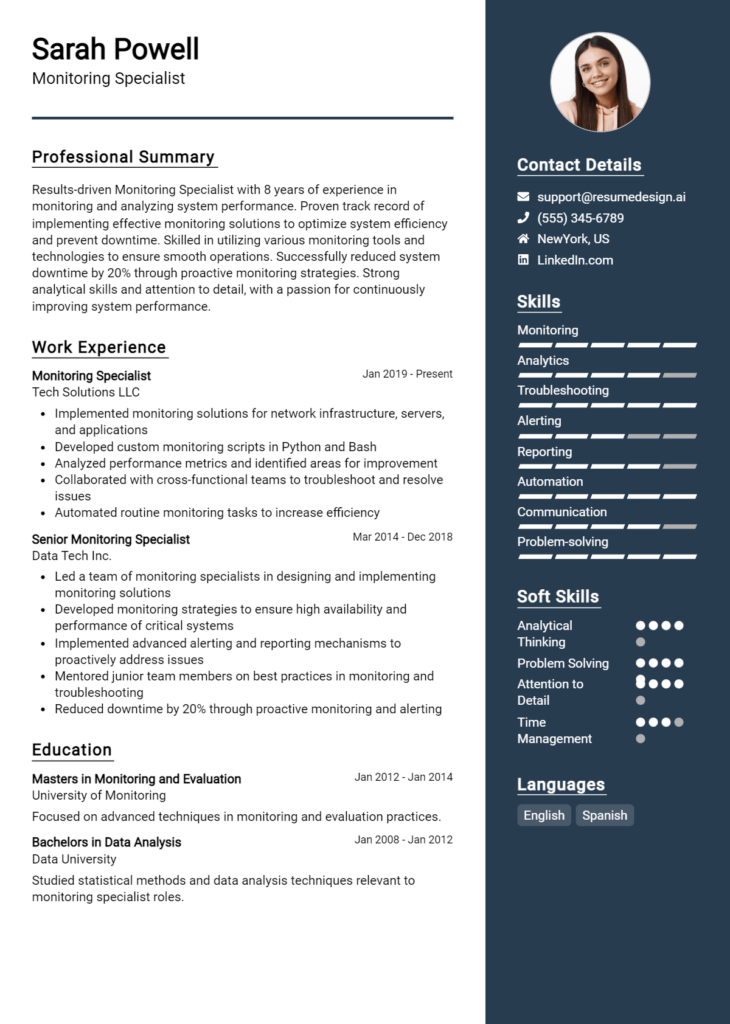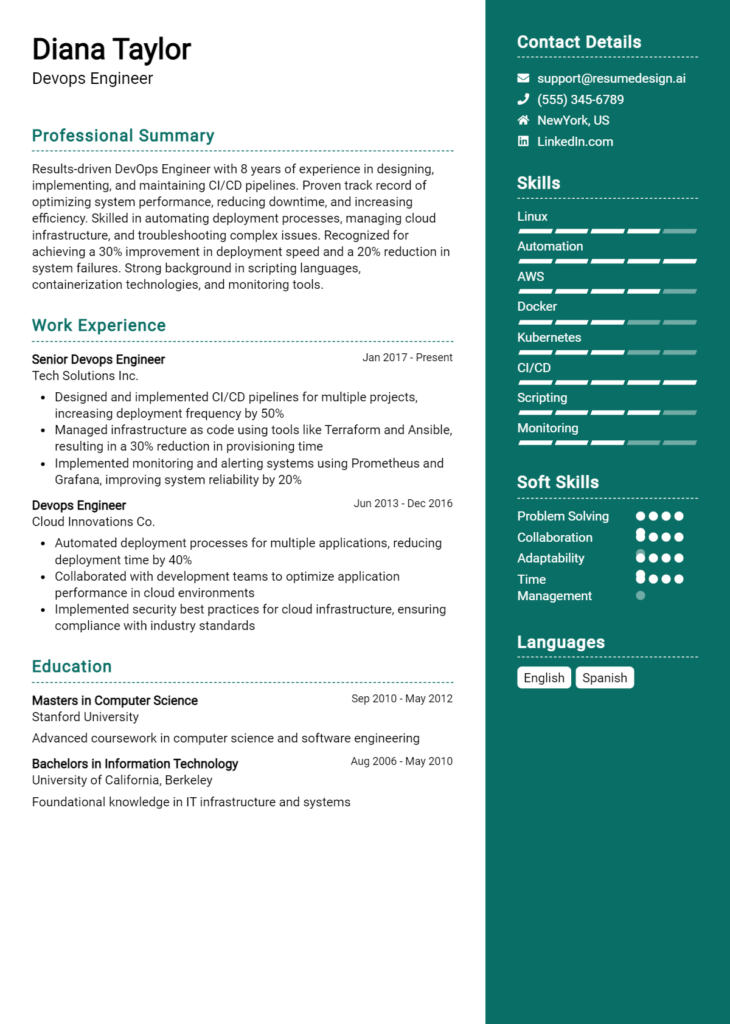Orchestration Specialist Core Responsibilities
An Orchestration Specialist plays a critical role in streamlining processes across various departments, ensuring seamless communication and collaboration between teams. Key responsibilities include designing and implementing orchestration workflows, analyzing system integrations, and troubleshooting operational issues. Essential skills encompass technical expertise in automation tools, strong analytical abilities, and adept problem-solving capabilities. Mastering these skills not only enhances operational efficiency but also aligns with the organization's strategic objectives. A well-structured resume highlights these qualifications, showcasing the candidate's ability to drive impactful results.
Common Responsibilities Listed on Orchestration Specialist Resume
- Develop and maintain orchestration workflows to enhance process efficiency.
- Analyze and troubleshoot integration issues across systems and platforms.
- Collaborate with cross-functional teams to gather requirements and implement solutions.
- Monitor and optimize orchestration performance and reliability.
- Document processes and provide training to team members as needed.
- Implement automation tools and technologies to streamline operations.
- Conduct regular audits to ensure compliance and best practices.
- Assist in project management and ensure timely delivery of objectives.
- Stay updated on industry trends and emerging technologies relevant to orchestration.
- Provide technical support and guidance to users and stakeholders.
High-Level Resume Tips for Orchestration Specialist Professionals
A well-crafted resume is crucial for Orchestration Specialist professionals, as it serves as the first impression to potential employers. In a competitive job market, your resume must effectively showcase your unique skills and accomplishments while aligning with the specific requirements of the position you are applying for. A strong resume not only highlights your technical expertise but also communicates your value as a candidate who can drive efficiency and innovation in orchestration processes. This guide will provide practical and actionable resume tips specifically tailored for Orchestration Specialist professionals, helping you stand out in a crowded field.
Top Resume Tips for Orchestration Specialist Professionals
- Tailor your resume to each job description by highlighting relevant skills and experiences that match the specific requirements of the position.
- Showcase your experience with orchestration tools and technologies, such as Kubernetes, Docker, and CI/CD pipelines, to demonstrate your technical proficiency.
- Quantify your achievements by using metrics to illustrate the impact of your work, such as reduced deployment times or increased system reliability.
- Include industry-specific keywords to optimize your resume for applicant tracking systems (ATS) and make it easier for hiring managers to find your application.
- Highlight soft skills such as problem-solving, communication, and collaboration, which are essential for success in orchestration roles.
- Utilize a clean and professional format that enhances readability, ensuring that your most important information stands out.
- Incorporate relevant certifications or training that demonstrate your commitment to professional development in orchestration and related technologies.
- Provide brief but impactful descriptions of your previous roles and responsibilities, focusing on your contributions to orchestration projects.
- Include a summary statement at the top of your resume that encapsulates your career objectives and key qualifications to capture the attention of hiring managers quickly.
By implementing these tips, you can significantly enhance your resume, making it a powerful tool in your job search. A well-structured and targeted resume will not only increase your chances of getting noticed by employers but also position you as a strong candidate for roles in the Orchestration Specialist field.
Why Resume Headlines & Titles are Important for Orchestration Specialist
In the competitive landscape of job applications, particularly for specialized roles like an Orchestration Specialist, a well-crafted resume headline or title is crucial. This succinct phrase serves as the first impression for hiring managers, offering a snapshot of a candidate's qualifications and expertise. A compelling headline not only grabs attention but also effectively summarizes key skills and experiences, making it easier for recruiters to quickly assess the suitability of a candidate. Therefore, it is essential for the headline to be concise, relevant, and tailored specifically to the orchestration specialist role being applied for.
Best Practices for Crafting Resume Headlines for Orchestration Specialist
- Keep it concise—limit to one impactful phrase.
- Use role-specific language to highlight relevant skills.
- Incorporate keywords from the job description to enhance relevance.
- Focus on measurable accomplishments or experiences.
- Make it attention-grabbing by using strong action verbs.
- Avoid jargon or overly complex terms that may confuse readers.
- Highlight unique qualifications that set you apart from other candidates.
- Ensure clarity and readability for quick understanding.
Example Resume Headlines for Orchestration Specialist
Strong Resume Headlines
"Results-Driven Orchestration Specialist with 5+ Years in Cloud Integration"
“Dynamic Orchestration Expert Specializing in Automated Workflow Solutions”
“Innovative Orchestration Specialist with Proven Track Record in Streamlining Operations”
Weak Resume Headlines
“Orchestration Specialist Seeking Opportunities”
“Experienced Professional in IT”
Strong headlines are effective because they clearly communicate specific skills, experiences, or achievements that resonate with the role of an Orchestration Specialist. They capture the attention of hiring managers by using relevant terminology and showcasing measurable outcomes. In contrast, weak headlines tend to be vague and generic, failing to convey the candidate's unique value or qualifications, making it easy for them to be overlooked in a stack of applications.
Work Experience Section for Orchestration Specialist Resume
The work experience section of an Orchestration Specialist resume is crucial as it provides potential employers with a clear view of the candidate's technical skills and their ability to manage teams effectively. This section not only showcases the candidate's expertise in orchestration technologies and processes but also highlights their capacity to deliver high-quality products on time and within budget. By quantifying achievements and aligning experiences with industry standards, candidates can demonstrate their value and relevance in a competitive job market, making it essential to craft this section with care and precision.
Best Practices for Orchestration Specialist Work Experience
- Highlight specific orchestration tools and technologies used in previous roles.
- Quantify achievements with metrics such as percentage improvements, cost savings, and project timelines.
- Emphasize leadership roles and collaborative projects that demonstrate team management skills.
- Align your experience with industry standards and requirements relevant to the job description.
- Use action verbs to convey impact and ownership of projects.
- Include certifications or training that enhance your technical expertise in orchestration.
- Tailor your experience to showcase problem-solving abilities and innovative solutions.
- Provide context for each role to clarify the scope and significance of your contributions.
Example Work Experiences for Orchestration Specialist
Strong Experiences
- Led a cross-functional team of 10 in the successful implementation of an orchestration platform that increased deployment efficiency by 40% over six months.
- Developed and optimized orchestration workflows that reduced processing time by 30%, resulting in annual savings of $250,000 for the organization.
- Collaborated with engineering and operations teams to integrate CI/CD pipelines, enhancing product delivery speed by 50% and reducing lead time for critical updates.
- Implemented a monitoring system that decreased downtime by 25%, significantly improving service reliability and customer satisfaction ratings.
Weak Experiences
- Worked on various projects related to orchestration without specific details or measurable outcomes.
- Assisted team members in implementing orchestration tools, but did not lead any initiatives or projects.
- Participated in meetings about orchestration processes but provided no specific contributions or results.
- Involved in general IT support tasks that included orchestration but lacked focus on specific achievements or improvements.
The examples categorized as strong demonstrate clear, quantifiable outcomes and emphasize leadership and collaboration, showcasing the candidate's direct impact on projects. In contrast, the weak experiences lack specificity, measurable results, and actionable contributions, which fail to communicate the candidate's capabilities effectively. This distinction is vital for making a compelling case to potential employers.
Education and Certifications Section for Orchestration Specialist Resume
The education and certifications section of an Orchestration Specialist resume serves as a critical component in showcasing a candidate's academic background and industry-relevant qualifications. This section not only highlights formal education but also emphasizes certifications and specialized training that reflect the candidate's commitment to continuous learning and professional development. By providing details on relevant coursework, certifications, and training, candidates can significantly enhance their credibility and demonstrate alignment with the specific requirements and expectations of the job role, making them more appealing to potential employers.
Best Practices for Orchestration Specialist Education and Certifications
- Focus on relevant degrees such as Computer Science, Information Technology, or related fields.
- Include industry-recognized certifications, like AWS Certified Solutions Architect or Kubernetes Administrator.
- Detail specialized training in orchestration tools like Apache Airflow, Kubernetes, or Docker.
- Highlight any relevant coursework that directly supports orchestration skills, such as cloud computing or DevOps methodologies.
- Be specific about certification dates to indicate up-to-date knowledge.
- List certifications in a hierarchy, placing the most relevant and recognized ones at the top.
- Include any ongoing education or workshops to show commitment to staying current in the field.
- Avoid including irrelevant or outdated qualifications that do not contribute to the orchestration role.
Example Education and Certifications for Orchestration Specialist
Strong Examples
- Bachelor of Science in Computer Science, University of Technology, 2019
- AWS Certified Solutions Architect – Associate, 2022
- Certified Kubernetes Administrator (CKA), 2021
- Coursework in Cloud Infrastructure and DevOps Practices, 2020
Weak Examples
- Associate Degree in Arts, Community College, 2018
- Certification in Microsoft Office Suite, 2017
- High School Diploma, 2016
- Certified Novell Administrator (CNA), 2005
The examples provided are considered strong because they directly align with the qualifications and skills needed for an Orchestration Specialist role, showcasing relevant education and up-to-date industry certifications. In contrast, the weak examples reflect qualifications that are either outdated or irrelevant to the orchestration field, such as basic office software certifications and unrelated degrees, which do not contribute to the candidate's suitability for the position.
Top Skills & Keywords for Orchestration Specialist Resume
An effective resume for an Orchestration Specialist is crucial in showcasing the relevant skills and experiences that align with the demands of this role. In a field where the integration of various technologies and processes is paramount, highlighting both hard and soft skills can significantly enhance a candidate's appeal to potential employers. Skills not only demonstrate a candidate's technical proficiency but also their ability to collaborate, communicate, and adapt in a dynamic environment. A well-crafted resume that emphasizes these skills can set candidates apart in a competitive job market.
Top Hard & Soft Skills for Orchestration Specialist
Soft Skills
- Strong communication skills
- Problem-solving abilities
- Team collaboration
- Adaptability to change
- Attention to detail
- Time management
- Critical thinking
- Conflict resolution
- Leadership qualities
- Customer service orientation
- Project management
- Analytical mindset
- Creativity in process improvement
- Interpersonal skills
Hard Skills
- Knowledge of orchestration tools (e.g., Kubernetes, Docker)
- Proficiency in programming languages (e.g., Python, Java)
- Experience with cloud platforms (e.g., AWS, Azure)
- Familiarity with CI/CD pipelines
- Understanding of API management
- Database management skills (e.g., SQL, NoSQL)
- Network configuration and management
- Experience with monitoring and logging tools
- Knowledge of containerization technologies
- Proficient in scripting languages (e.g., Bash, PowerShell)
- Security best practices in orchestration
- Automation frameworks (e.g., Ansible, Terraform)
- System integration techniques
- Familiarity with Agile methodologies
- Configuration management tools (e.g., Puppet, Chef)
- Data analysis and reporting skills
- Understanding of DevOps principles
To further enhance your resume, consider exploring additional resources on skills and work experience that can help in effectively showcasing your qualifications as an Orchestration Specialist.
Stand Out with a Winning Orchestration Specialist Cover Letter
I am writing to express my interest in the Orchestration Specialist position at [Company Name], as advertised on [where you found the job listing]. With my extensive experience in cloud technologies, workflow automation, and orchestration frameworks, I am confident in my ability to contribute effectively to your team and help streamline your operations to enhance efficiency and productivity.
Throughout my career, I have successfully implemented orchestration solutions that have significantly improved system performance and reduced operational costs. For instance, in my previous role at [Previous Company Name], I was responsible for designing and deploying an automated orchestration platform that integrated various services, resulting in a 30% decrease in processing time for critical workflows. My proficiency with tools like Kubernetes, Jenkins, and Ansible, combined with my strong analytical skills, enables me to identify opportunities for automation and execute strategies that lead to tangible results.
I am particularly drawn to [Company Name] because of its commitment to innovation and excellence in [specific area relevant to the company]. I admire how your team leverages cutting-edge technologies to solve complex problems, and I am eager to bring my expertise in orchestration to further enhance your operational capabilities. I thrive in dynamic environments and am adept at collaborating with cross-functional teams to ensure seamless integration and execution of orchestration strategies.
Thank you for considering my application. I am looking forward to the possibility of discussing how my background, skills, and enthusiasm for orchestration can align with the goals of [Company Name]. I am excited about the opportunity to contribute to your team and help drive the success of your orchestration initiatives.
Common Mistakes to Avoid in a Orchestration Specialist Resume
When applying for a position as an Orchestration Specialist, your resume serves as your first impression and a crucial tool for landing an interview. However, many candidates make common mistakes that can hinder their chances of being noticed by hiring managers. To ensure your resume stands out for the right reasons, it's important to avoid these pitfalls:
Lack of Relevant Keywords: Failing to include industry-specific terminology can result in your resume being overlooked by applicant tracking systems (ATS) that scan for relevant keywords.
Generic Objective Statements: Using a one-size-fits-all objective statement can come across as insincere. Tailor your objective to reflect your specific interest in orchestration and how your skills align with the company's goals.
Overloading with Technical Jargon: While showcasing your technical proficiency is important, using excessive jargon can alienate readers. Aim for clarity and balance technical terms with easily understandable language.
Neglecting Soft Skills: Focusing solely on technical skills can be a mistake. Highlighting your problem-solving abilities, communication skills, and teamwork can make you a more appealing candidate.
Inconsistent Formatting: A resume that lacks a consistent format can be visually unappealing and hard to read. Ensure uniformity in font, bullet points, and spacing to create a professional look.
Ignoring Accomplishments: Merely listing job duties without showcasing your achievements can diminish the impact of your experience. Use quantifiable results to demonstrate how you've added value in previous roles.
Not Customizing Each Application: Sending the same resume for every job application can hurt your chances. Customize your resume to highlight the skills and experiences most relevant to each specific job description.
Inadequate Contact Information: Failing to provide complete and accurate contact information can prevent potential employers from reaching out. Ensure your email address and phone number are clearly listed and professional.
Conclusion
As an Orchestration Specialist, you play a pivotal role in ensuring seamless integration and automation of processes within an organization. Your responsibilities include managing workflows, optimizing system interactions, and enhancing operational efficiency. In this article, we covered essential skills such as proficiency in orchestration tools, understanding of cloud services, and the ability to collaborate with cross-functional teams.
In addition, we discussed the importance of showcasing your project management capabilities and technical expertise on your resume. Highlighting your experience with various orchestration platforms and your success in implementing effective solutions can significantly enhance your appeal to prospective employers.
Now, it's time to take action! Review your Orchestration Specialist resume to ensure it effectively showcases your skills and achievements. Utilize the available resources to strengthen your application. Check out these helpful tools:
- Resume Templates to find designs that suit your style.
- Resume Builder for a user-friendly way to create and customize your resume.
- Resume Examples for inspiration on how to present your qualifications.
- Cover Letter Templates to accompany your resume with a strong introduction.
Take the next step in your career by refining your resume today!

